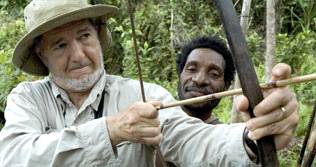Intellectual Trespassing
By Paul
 Recently there has been some controversy brewing across the blogosphere about Jared Diamondís book Guns, Germs and Steel.
Recently there has been some controversy brewing across the blogosphere about Jared Diamondís book Guns, Germs and Steel.
Many expert generalists and synthesizers (Diamond is physiologist specializing in membrane physiology of the intestine, an ornithologist the first westerner to observe the mating rituals of the golden-fronted bowerbird and wrote a book called Why is Sex Fun, and a historian all rolled into one) run into trouble with specialists who often fails to see the big picture. Of course there are legitimate criticisms of his views in Guns, Germs and Steel and his most recent book Collapse.
Even Bill Gates praises Guns, Germs and Steel:
It's the first explanation of history I've seen that gets at the key question of why Europeans and Asians, came to control most of the world, rather than Africans, Native Americans or other people.Diamond's primary thesis is that there's no inherent superiority among any racial or ethnic groups, and that the often-tragic failure of other races to resist expansion by other peoples was largely a matter of bad luck.
What Iím amazed is how he manages to churn out these massive tomes when he doesnít even use a computer (Bill Gates doesnít explain this):
I do not have a computer. I do not know how to turn on a computer.
Further he explains his approach when questioned about his approach to generalist thinking:
Q: Is there a process that you go through, a way you organize your thinking, to be able to synthesize from such a broad array of fields?A: A couple things. One is that I found that the more things youíre interested in and the more you learn, the richer the framework into which you can fit any new thing. So synthesis, if you do it at all, gets professionally easier with time. Itís no surprise that older people can do better at synthesis, because theyíve been learning their entire lives. Itís the opposite of, say, reasoning skills in mathematics. Synthesis increases with age as you learn more.
Iíll show you upstairs one of the chapters that Iím working on for my next book. Itís about the history of Viking Greenland. When I started reading about Greenland, one of the first things I wondered was: Where did their iron come from? Another thing I wondered was: Could grain grow there? So knowing about other things, there were just more questions I could ask about Viking Greenland.
As for how I actually go about working with some new area, youíll see the piles of books and papers upstairs ó I do lots of reading, I talk to people, I find out who has written
stuff in an area, and then I call them up and I ask them to recommend more things, which I then read and I come back to them with questions. Then, if possible, I go visit the sites.
Iím hoping to go visit Greenland this summer. I read the stuff, I take notes on it, I organize, I type up the notes, my secretary transcribes my dictation, and then I organize notes into topic headings, and the topic headings then get organized into different sections of the chapter.
Book Recommendation: Intellectual Trespassing As A Way of Life
Here are two good lectures from Jared Diamond; The Broadest Pattern of Human History and Ecological Collapses of Pre-industrial Societies.
Comments